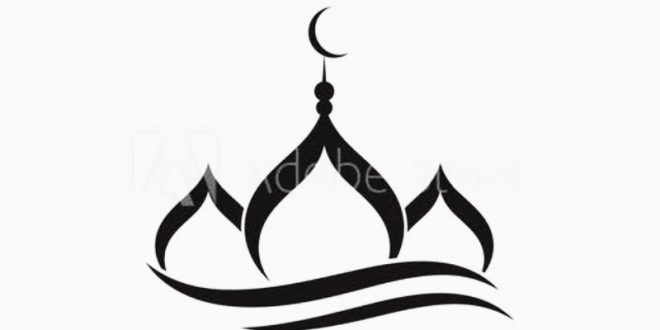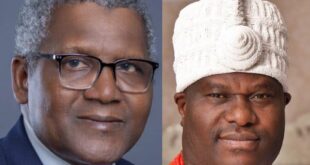Opinion:
By: Tomasi Akingbade
Leadership is essentially a continuous process of influencing behaviour, it may be considered in context of mutual relations between a leader and his followers. The leader tries to influence the behaviour of individuals around him to achieve desired goals. It is also a dynamic process, which deserves study; it is a relational process involving interactions among leaders, members and sometimes outside constituencies. Good leaders are made not born. If you have the desire and willpower, you can become an effective leader. Basically, it involves developing those qualities and attitudes in managers which help to look into the future and to bring necessary improvement pertaining to different leadership styles.
Leadership in Islam, Islam, the complete code of life, declares leadership as a trust (Amanah), and gives a detailed description about it. According to the Islamic view, leadership is a sacred position that can solve the problems of humanity and guide them to the eternal betterment of here and hereafter. It is a person or a group of people who guide and lead the followers, the humanity from the brink of destruction to the way of Allah. Giving preference on human welfare Islam exposes leadership as a psychological contract between a leader and his followers that he will try his best to guide them, to protect them and to treat them fairly and with justice.
Hence, the focus of leadership in Islam is on doing good, Great Muslim scholar Ibn Khaldun in his excellent book Al-Muqaddimah draws a new dimension of leadership. He says- “leadership is an outcome of interaction between different social groups.” Al Buraey says-“an Islamic leadership is the one that seeks happiness for the individual and society.” In Islamic Shari’ah, leadership is mentioned specially by the word Khilafa and Imama. Though there remain other words used as the meaning of a Leader in various Islamic verses and speeches such as Amir-ul-Muminin, Amir, Ja`eem, Sayyid, Qa’eed, Malik, Sheikh etc. But yet the words mentioned earlier are the most famous and most important in describing the state of leadership.
With some differences in practice all of these words are used interchangeably to indicate a leader. Muslim thinkers of the modern era differentiate among these synonymous words. A brief discussion about these may clarify the area of their application. Firstly, Khalifa (Caliph), derived from the word Khilafa (Caliphate-system of governance established in Islam), means, literally, the successor, the vicegerent or the representative while as the term of Islamic literature it means the head of state in a Caliphate, and the title for the leader of the Islamic Ummah, an Islamic community ruled by the Shari’ah. Al Qur’an, the supreme authoritative source of Islamic Sharia, uses this term with two different meanings.
Following verse Khalifa refers to Hazrat Adam (s) including whole mankind and the prophets-Allah says- “And then (after creating heaven and earth) Allah told the angel that he was about to create a vicegerent (khalifah) and to assign him to the earth.” In another verse Allah addressed Hazrat Dawood (s) as both, the role of the leader of his state and the Prophet. Allah says- “(And it was said unto him): O David! Lo! We have set thee as a viceroy (Leader) in the earth; therefore judge aright between mankind, and follow not desire that it beguile thee from the way of Allah. Lo! Those who wander from the way of Allah have an awful doom, forasmuch as they forgot the Day of Reckoning.” However, Khalifa is now a day used to indicate the position of the head and supreme political leader of the state by the Muslim thinkers. It is asserted by Muslim historians that the term Khalifa was first used as the title of “the successor of Muhammad” by Abu Bakr.
The decision making process of conventional form mainly depends upon the leader or upon the group of authority. Usually they decide according to the reference of organizational rules. Islamic concept of leadership usually does not permit a leader to make decisions without any kind of consultation. In public affairs a leader must have a general consultation with all of his followers. And after the consent of the group he has to justify that decision with the divine law of Islamic Sharia. Appointment process of a leader is not similar in every organization in modern formation. Most of the organizations, formal or informal, have their own criteria to select a leader. Unfortunately, absence of ethical and moral values is a common feature of conventional leadership.
Here, a person must submit his candidature for the leadership. In contrast, Islam has its own preconditions to appoint a leader. Seeking leadership is considered as a disqualification of the person. According to the Islamic law, leaders must not seek leadership; it must come to them. Moral and ethical perfection is badly needed in the selection process of leaders. Along with personal qualities, the knowledge of Islamic principles and Sharia is a must for the leadership.
Now, the concept of leadership in conventional and Islamic formation is totally different by nature, though there are some similarities seen in the performances of leaders in various occasions. Islam does a great job in this respective field and shows how followers perform their responsibilities with the proper direction of revealed law under the supervision of a competent leader ensuring the humanism and ultimate satisfaction of almighty Allah. Characteristics of leadership are an important element to achieve success and to establish peace and happiness in society. Islam always tries to make sure the rule of the best on every sphere of life, individual or social.
For this, it elaborately declares the qualities and pre-conditions needed for an ideal leader. Islamic Sharia composed of the authoritative source of Al Qur’an and the Sunnah, along with the Islamic Fiqh has given the direction. The attributes of the righteous caliphs also helps us to determine the required qualities to select a leader for the Muslim Ummah. Under a scientific examination throughout these sources Muslim scholars have find out some essential qualities for an Islamic leader. A great thinker al Farabi indicates the following characteristics of leadership- be intelligence, full of wisdom, possess complementary characters in terms of their physical and abilities, ideal long-sighted policy makers etc. Hadrat Ali, the fourth khalifah, in discussing the qualities of a leader said: “O People! You know that it is not fitting that one who is greedy and parsimonious should attain rule and authority over the honour, lives and incomes of the Muslims, and the laws and ordinances enforced among them, and also leadership of them. Furthermore, he should not be ignorant and unaware of the law, lest in his ignorance he misleads the people. He must not be unjust and harsh, causing people to cease all traffic and dealings.
A good leader must do away with his oppressiveness. Nor must he fear states, so that he seeks the friendship of some and treats others with enmity. He must refrain from accepting bribes when he sits in judgment, so that the rights of men are trampled underfoot and the claimant does not receive his due. He must not leave the Sunnah of the Prophet and the law in abeyance, so that the community falls into misguidance and peril. A leader must be a profound knowledge of Sunnah (i.e. Islamic Sharia), proficiency at reciting the holy Qur’an, must have great consciousness of Allah (Taqwa), an elderly person these features must be examined to select a leader respectively.
A person to be qualified as Amir (chief executive of the Islamic state) shall be: not less than 40 years of age and not more than 63 years of age, Shall not be qualified for the election as a member of Islamic State Assembly or Parliament Majlis, Shura shall not have been removed from the office of the Amir under the constitution, shall not have been convicted for any criminal offences or an invalid or bankrupt person, declared by a competent court. Indeed, some modern Islamists identified some core characteristics for the Islamic managerial leadership, such as- Allegiance, Global Islamic Goals, Adherence to Sharia and Islamic Manners, Delegated Trust etc.
More importantly, leadership involves a clear vision, sharing the vision with others so that they will follow willingly, providing the information, knowledge and method to realize that vision and coordinating and balancing the conflicting interests of all members and stakeholders. Indeed, it is the ability to develop a vision that motivates others to move with a passion towards a common goal. So, leadership is a process by which a person influences others to accomplish an objective and directs the organization or people in a way that makes it or them more cohesive and coherent.
There are also three qualities that are compulsory for a good leader of an Islamic background. Those are: Taqwa; Patience and tolerance; Kindness leadership. Regarding the function of leadership Zafar Bangash, a modern Islamic scholar, mentions some operational tasks. According to him a leader must have the technical quality to do those tasks accurately. These are- 1. Articulate the goal or vision clearly and demonstrate his personal conviction for it; 2. Inspire a group of people to follow it; 3. Evaluate the prevailing situation accurately and devise appropriate strategies for dealing with it, including surmounting problems, difficulties, etc. 4. Initiate, guide, direct and control change towards the desired goal; 5. Ensure continuous cooperation of the movement.
Without these qualifications no one can be eligible to lead the Nation. Even, for the leader of a small group or organization these are much more essential. After a thoughtful study on the discussion of the sources of Sharia regarding Islamic leadership and the thoughts of Muslim scholars we can mention the core pre-requisites of a good leader as given below. Iman: The leader must believe in the core Islamic beliefs, and should be considered as a true Muslim by his words and deeds. According to Islam, Iman is the very fact on which whole universe and creations are still alive and every Muslim has the responsibility to establish Iman and its regulations in all aspects of life. So, if anyone does not believe in Islamic beliefs and ideology, he must not be considered as a leader of Muslim as Allah directly declares- “Allah will judge between you at the Day of Resurrection, and Allah will not give the disbelievers any way (of success or leadership) against the believers.
”Allah again says- “O ye who believe! Obey Allah, and obey the messenger and those of you who are in authority (leaders); and if ye have a dispute concerning any matter, refer it to Allah and the messenger if ye are (in truth) believers in Allah and the Last Day. That is better and more likely in the end.” Maturity: The leader must have the maturity of age and soundness in mental and physical condition. Maturity gives him the experiences and patience to face the contemporary challenges. On the other hand, Mental and physical strength is needed in every action to do that properly. Al Qur’an declares in this regard-“Give not unto the foolish (what is in) your (keeping of their) wealth, which Allah hath given you to maintain; but feed and clothe them from it, and speak kindly unto them.”
In another verse Allah says- “Their Prophet said unto them: Lo! Allah hath raised up Saul to be a king for you. They said: How can he have kingdom over us when we are more deserving of the kingdom than he is, since he has not been given wealth enough? He said: Lo! Allah hath chosen him above you, and hath increased him abundantly in wisdom and stature. Allah bestowed His Sovereignty on whom He will. Allah is All-Embracing, All-Knowing.” So, the concepts of leader and leadership in Islam, ICIT papers on Muslim political thought, presented on the International conference on “The Seerah: A power perspective”, Colombo, Sri Lanka, on June 16 -18,2000, pp. 4-5 26 Al Qur’an, 4:141 27 Al Qur’an, 4:59 28 Al Qur’an, 4:5 29 Al Qur’an, 2:247.
*Akingbade, a public and political affairs commentator, writes from Akure, Ondo State, Nigeria.
 Startrend International Magazine For Your Latest News And Entertainment Gists
Startrend International Magazine For Your Latest News And Entertainment Gists





